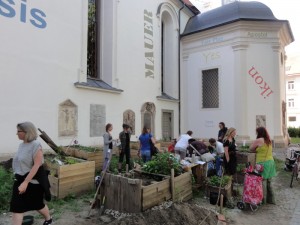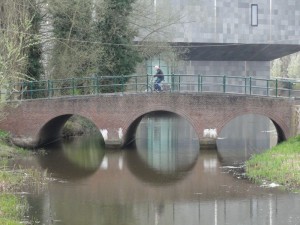 From the politics of local food production to genetic modification to the impact of the world-wide decline of bees on food production, we once again had a wide-ranging situation and a plethora of research material to draw on for the Graz situation, titled “Unidentified Flying Food”. Continue reading “Eating Graz”
From the politics of local food production to genetic modification to the impact of the world-wide decline of bees on food production, we once again had a wide-ranging situation and a plethora of research material to draw on for the Graz situation, titled “Unidentified Flying Food”. Continue reading “Eating Graz”
Category: helen
the half-way mark
 We are half-way into the workshop for the Graz situation, and I’m happy to report that all is going well. Nearly all of the technical issues are sorted – today we will test sound and make decisions about the number of laptops the network can handle – and we have a pretty good outline and a lot of media already created. All is looking good for a run-through tomorrow! Continue reading “the half-way mark”
We are half-way into the workshop for the Graz situation, and I’m happy to report that all is going well. Nearly all of the technical issues are sorted – today we will test sound and make decisions about the number of laptops the network can handle – and we have a pretty good outline and a lot of media already created. All is looking good for a run-through tomorrow! Continue reading “the half-way mark”
Three down, one to go …
It’s amazing how fast this project is going; we have completed the first 3 situations and in just over a week will begin the fourth, which is also the final situation for this funding period. Since we began preparing for the situations, we have learned a lot – about the topics we’ve been working with as well as the technologies and processes – and this learning will feed into the fourth situation. Continue reading “Three down, one to go …”
Eindhoven Reflections
 This was my first visit to Eindhoven; I discovered a compact, walkable, friendly city, much influenced by the 100+ years of Philips, the electronics giant which began here as a small lightbulb factory in 1891. Half of the city seems to have been built by Philips – even the library where our “situation” took place is located in a former Philips factory, affectionately known by the locals as “the white lady”. Continue reading “Eindhoven Reflections”
This was my first visit to Eindhoven; I discovered a compact, walkable, friendly city, much influenced by the 100+ years of Philips, the electronics giant which began here as a small lightbulb factory in 1891. Half of the city seems to have been built by Philips – even the library where our “situation” took place is located in a former Philips factory, affectionately known by the locals as “the white lady”. Continue reading “Eindhoven Reflections”
Preparing for Nantes
The other day I watched a 25-minute video about taking apart & recycling a Boeing 747 airplane; the movie is Hollywood style, with plenty of dramatic music & quoting lots of numbers – how heavy things are, how much money the recycled parts will sell for, what wind-speeds the nose of the plane can withstand and so on. The men doing the work (yes, all men) are interviewed about how dangerous their work is (no-one is wearing a hard-hat – but perhaps that would be a bit ineffective if a jet engine fell on you). I had never previously given much thought to what happens to retired planes, and it seems not many other people have either, since apparently most of them simply get left to rust and rot on old runways in places like Arizona. Only recently has the airline industry begun to recognise the value in recycling the planes, and this video documents the first Boeing to be recycled. Continue reading “Preparing for Nantes”